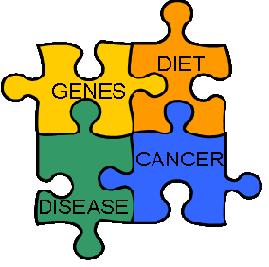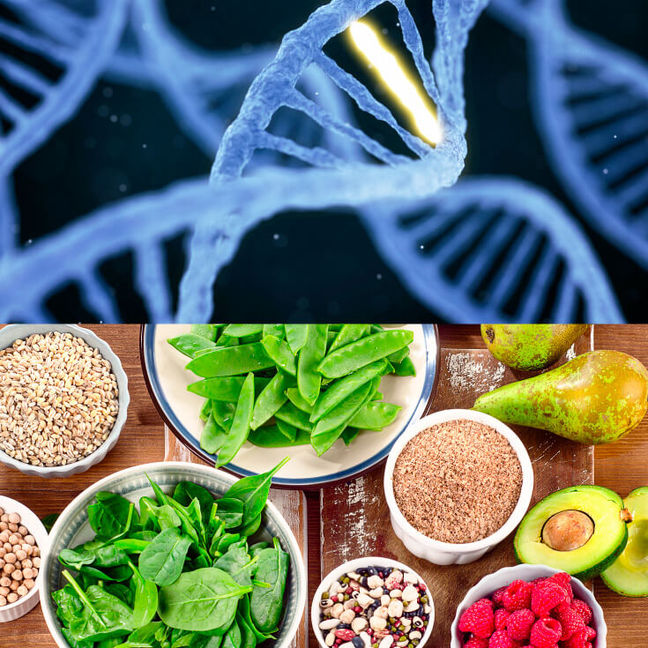|
Cancer cells are a result of environmental, dietary and infectious agents. The causative factors of cancer are many, but only a few of them have been identified. The foremost important cause of cancer is tobacco while other factors such as diet, alcohol, activity level, infections, hormones and radiation exposure are secondary contributors.
Cancer rates are exponentially on the rise and it is expected that there would be about 50% more people affected by this disease by 2020. We need to come up with flawless prevention strategies for this public health problem. Even before 35 years, researchers commented that diet contributed to almost 35% risk of an individual developing cancer. Ongoing studies since then have tried to prove that different dietary components can reduce/delay/prevent cancer development and progression. Although diet might be a major contributor for cancer risk, the exact percentage entirely depends on the type of diet consumed and the type of cancer too. We cannot tell clearly about the reaction of food, digestion process of that food, metabolism and waste elimination specifically with regards to every individual and this prevents us from recognizing the most important foods for health. Genetic variation in the way in which any food is transported and metabolized affects their impact on cancer. Exploring nutrigenetics, nutrigenomics and epigenetics can help unravel the mysteries of what type of individuals can benefit from or face a loss due to dietary changes. Other criteria, such as bacteria, virus, environment contamination and calories can have a great impact on diet-phenotype relationship. Don’t be surprised to know that we have already achieved a milestone in genetics by making genetic testing available for more than 1,700 diseases. Also, pharmaceutical testing is fast emerging as a reliable method to check the success rate of a particular drug, but this has not yet been achieved in the stream of nutrigenetics. Availability of database to use this genetic information and develop personalized strategies is the need of the day. Copy number (genome repeats) might also affect the response to diet to as much as 25%. Further study is needed in this area as well in the field of gene polymorphism and deletions to pinpoint the reason behind the risk variations and how exactly they affect cancer process. The entire load cannot be placed over genomic and epigenomic processes to affect the impact of dietary factors on phenotypic changes as alterations in the rate of transcription genes can be critical for cellular processes. Also, bioactive food components (essential and non-essential nutrients) can affect gene expression and their impact on gene transcription and translation is time dependent. But, these can prove useful when it comes to picking individual food components that can affect one or more food processes, which includes those involved in the risk of cancer development and tumor behavior. Excess body weight and physical inactivity account for nearly one-fifth to one-third of many of the different cancers, especially that of the colon, breast, endometrium, kidney and esophagus. Though numerous studies link breast, colon, prostate, liver and lung cancer to dietary intakes, the role of nutrigenetics in the field of cancer cure/therapy needs further research. In-depth research in this field can help realize nutritional needs of an individual based on genetic profile and can also help in curing chronic diseases. Diet can do wonders on the human health. It not only helps to promote the well-being of an individual but also can go to the extent of affecting the flow of genetic information. Bioactive compounds play a deciding role in human health through advances in genomics, transcriptomics, proteomics and metabolomics. These technologies can directly be applied to cell culture and animal/human studies to study the health-promoting benefits of dietary bioactive compounds. A specific/restricted set of research is not enough to come to a conclusive decision on these studies and we need a combination of in vitro, animal, clinical and epidemiologic studies to understand the role of bioactive compounds in maintaining health of humans.
The human gut is gaining prominence and hence, the fermented foods and probiotics industry are utilizing this opportunity to profit from this as these foods are good for the gut. Researchers are interested in exploring the science behind gut microflora and the interaction between the microbiome and host genome. Interaction between Nutrients & Bioactive Compounds Physiological processes such as absorption, transport, biotransformation, uptake, binding, storage and excretion affect the impact of nutrients and bioactive compounds. Every physiological process involves multiple genes (each of them contain common polymorphisms) that can alter its function and hence, the response to a dietary compound. Genes affect food choices too-If you are person who prefers spicy foods or love to eat a pastry, that might also be the effect of genes-and research on diet-gene interactions are being done increasingly. If these researches are a success, then food industries can develop novel food products targeting a specific genotype or ethnic race and also provide solutions to questions that linger in our minds relating to why certain foods increase the risk of certain chronic diseases. When we tell that certain characteristics or diseases are passed generation to generation, we do not mean that the younger generations carry a photo copy of the genes of their ancestors. Variations in genes are common and widespread. These genetic variations are becoming increasingly complex due to several factors-environmental, nutrition and much more. Single nucleotide polymorphisms (SNPs), nucleotide repeats, insertions and deletions are some of the variations that can impact an individual’s response to a diet. Experiments are the best way to find other variants that can have a longstanding effect on dietary choices. A complete understanding of the different variants and food bioactives help us better interpret the role these play in human health and disease risk. Such gene-diet interactions help in planning individualized dietary advice and further, can play a critical role in improving public health by relating specific dietary compounds to different health outcomes. Genes may be passed over, but the nutrients we consume alter the expression of this genetic information at the level of gene regulation, signal transduction and also through alterations in chromatin structure and protein function. Other factors that impact gene expression include:
A classic example of the effect of nutrigenomics on dietary factors is the case study of coffee and heart disease. Numerous studies have taken up this case study and concluded that coffee either increases risk, has no effect or decreases risk. While there are various bioactive compounds available in coffee, caffeine dominates the rest and is said to have a harmful effect on the heart health of individuals. Caffeine-rich coffee increases the risk of heart attack in individuals who are carriers of one version of genes that put them in the ‘slow’ caffeine metabolizers category. This same caffeine is said to have no effect on the ‘fast’ caffeine metabolizers. Gene research and information in the field of nutrition helps to:
For decades, research focused on nutrition believing that all adults possess the same nutritional requirements. They also realized that the nutrition needs differed for adults and children as well as between the male and female population. Dietary guidelines are formulated with the basic need of preventing deficiency diseases. This is also the principle on which the RDA works defining the quantity of nutrients required per day for almost all people to stay healthy.
Recent years have seen many research and studies performed on the effect of genes and gene variants on dietary supplements. Nutrigenetics play a prominent role in helping us understand the genetic basis of health and disease in planning a personalized nutrition chart. Nutrition specialists are becoming adept in understanding the information on genes, gene variants, diet, lifestyle and environment so that they can formulate nutrition plans depending on the genetic base of every person. Pharma Industry & Gene Variants Personalized pharma care was not a great hit in the past, but with the number of individuals dying every year due to adverse drug reactions, the pharma industry is gaining potential in this context. For different drugs, variants in drug metabolism genes or other genes that affect the individuals’ response to the pharmaceutical is measured. For instance, such pharmaceutical intervention is becoming increasingly seen in the popular breast cancer drug, tamoxifen. This kind of personalization in consumer goods and the acceptance of people to pay a high price to such individualizations is an indication that the market is ready to accept personalized nutrition to treat, manage or prevent specific medical conditions. A classic example of personalized nutrition is the presence of celiac disease which calls for gluten-free eating. This disease runs in the family and carrying a gene for this disease does not establish the fact that the person is bound to suffer from it, but only means that the individual has a genetic predisposition to dietary factors. The public is showing increased interest in staying healthy and well. By health, we mean continued state of soundness and vigor of body and mind. The food industry strives hard to fulfill the nutritional and health needs of individuals. Sadly, many consumers choose foods depending on their convenience, price, desire and appearance. The question remains if public health can be improved with personalized nutrition practices. What would be the cost of such practices and would it be affordable only by the luxurious few? Any new discovery comes with its own pros and cons and so does the utilization of nutrigenetics/nutrigenomics in public health care. These include trivializing the role of genes in health and suppressing general healthy eating messages. Presently, people are not much concerned or are rather confused about principles such as ‘exercise more’ or ‘eat less calories’. But, in the long run, these techniques are the only ways to optimize nutrition for health and wellness. |
AuthorDietitian & Nutritionist Dr. Nafeesa Imteyaz. ArchivesCategories |
- Home
- Written Testimonials
- Consult
- Clinics
- Blogs
-
Diet & Nutrition
- Diabetes Reversal
- IVF IUI not needed for PCOS PCOD Infertility
-
Medical Nutrition
>
-
Disease & Conditions
>
- Infertility | PCOS
- Diabetes Mellitus
- Cholesterol
- Hypothyroid
- Kidney Problems
- Hypertension
- Cardiovascular Diseases
- Liver Diseases
- Gastro intestinal disorder
- Cancer
- Metabolic Disorders
- Orthopedic Disorders
- Eating Disorders
- Dietary Recall
- Weight Record Filled By Clients
- Online Payment Transaction Details
- Online Clients Weight Check Form
- Our Program Package Service Charges
- Weight Record 2017 Clients
- Measurements sent by Clients
- Terms & Conditions Of Payment
- Thanks. Your Form is Submitted
- Video Testimonials
- Lifestyle & Wellness
- Lifestyle & Wellness Blog
- Allergy & Intolerance
- Weight Loss / Gain
- Weight Loss / Slimming Blog
-
Disease & Conditions
>
- Life Cycle Nutrition >
- Sports Nutrition >
- Integrity in Nutrition
- Knowledge Centre
© COPYRIGHT 2022. ALL RIGHTS RESERVED. FRST HEALTHCARE PVT LTD.
Dr. Nafeesa Imteyaz of First Eat Right clinic, is the Best Dietitian Nutritionist in Bangalore. Best Dietitian Nutritionist in Pune. Best Dietitian Nutritionist in Hyderabad. Best Dietitian Nutritionist in Chennai. Best Dietitian Nutritionist in Mumbai. Best Dietitian Nutritionist in Delhi. Best Dietitian Nutritionist in Kolkata.



